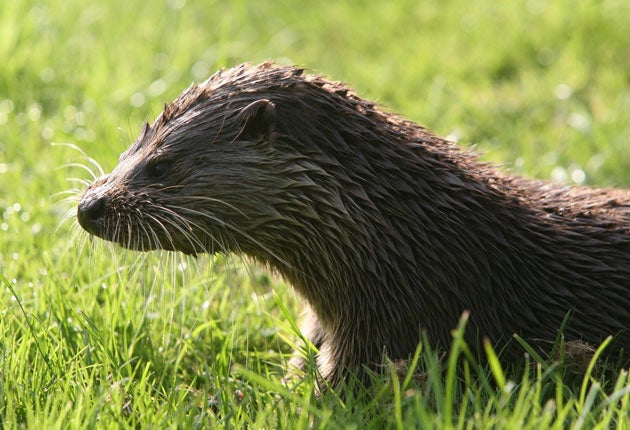Back from the brink: otters return to our rivers
Improved water quality and legislation have boosted the population of this elusive and much-loved animal. By Terri Judd

Your support helps us to tell the story
From reproductive rights to climate change to Big Tech, The Independent is on the ground when the story is developing. Whether it's investigating the financials of Elon Musk's pro-Trump PAC or producing our latest documentary, 'The A Word', which shines a light on the American women fighting for reproductive rights, we know how important it is to parse out the facts from the messaging.
At such a critical moment in US history, we need reporters on the ground. Your donation allows us to keep sending journalists to speak to both sides of the story.
The Independent is trusted by Americans across the entire political spectrum. And unlike many other quality news outlets, we choose not to lock Americans out of our reporting and analysis with paywalls. We believe quality journalism should be available to everyone, paid for by those who can afford it.
Your support makes all the difference.For the past 40 years or more, the sight of otters playing in England's rivers has been a desperately rare treat. Now, at last, it seems the tide is turning in favour of the country's favourite water dwelling animal, which has been brought back from the brink of extinction against the odds.
A report by the Environment Agency published today reveals that numbers of the once elusive animal are at their highest for decades.
Poisoned by toxic pesticides in rivers, the animals had almost disappeared by the 1970s. The sight of the inquisitive, intelligent, agile animals darting through the water leaving a v-shaped trail with their nose was more likely to be seen in films than on Britain's waterways.
But a concerted effort to protect the otter, including the introduction of legislation which made it an offence to intentionally kill or harm the animals, has brought about a dramatic resurgence. Every county in England, bar one, can now boast an otter population – and some are even reaching maximum capacity.
The Environment Agency is now predicting that the species will fully recover in less than 20 years. The first survey for eight years revealed a jump in otter sites since their numbers were last counted. An examination of 3,327 river sites across the country between July 2009 and March 2010 showed a tenfold increase in otter populations over the past 30 years.
The most likely place to spot an otter is along the River Wye in south-west England, where the population has reached maximum capacity, but rivers in Northumbria, Cumbria, Wessex and the Upper Severn also have healthy numbers.
Paul Raven, head of conservation and ecology at the Environment Agency, explained that a significant improvement in water quality over the past 20 years – which brought fish back to rivers that were once grossly polluted – was the key reason behind the animal's remarkable resurgence.
"The otter is at the top of the food chain, and as such is an important indicator of the health of English rivers," he said. "The recovery of otters from near-extinction shows how far we've come in controlling pollution and improving water quality. Rivers in England are the healthiest for over 20 years, and otters, salmon and other wildlife are returning to many rivers for the first time since the Industrial Revolution.
"But there is still work to be done, and we will continue to work with farmers, businesses and water companies to reduce pollution and improve water quality even further, to ensure the full recovery of the otter across the country."
The pattern of recovery differs according to region, with East Anglia and the Thames and its tributaries showing the biggest increase in positive signs since 2000-02. Kent is the only county where otters have yet to return – although environmentalists predict they will be back within the next 10 years.
Helen Perkins, of the Wildlife Trusts, which works to save otters, said the results were "fantastic news". But she added: "We must not be complacent. Otters face a number of threats; for example, from road traffic accidents, and recovery is very slow in the south-east of England. We will continue our work to improve habitats for these magnificent animals and to promote the otter as a flagship species of healthy wetland ecosystems."
Life on the river
* The sun moved above the oakwood that sloped from the rocky bank across the river; the leaves of lower branches were blenched, and weed-hung. A hot, broken glitter, like a flight of silver birds, played lightly on the green flags where Tarka was Iying. One brilliant beak of light slipped round a flag and pecked at his eye until he awoke, and yawned, and turned on his back.
His nostrils lazily tested the wind that sometimes trembled the tips of the flags. It was a clean wind, and he lay content. Three buzzards sailed over the river, one above the other, like the stars in Orion's Belt.
From Tarka the Otter (1927) by Henry Williamson
Join our commenting forum
Join thought-provoking conversations, follow other Independent readers and see their replies
0Comments